Northern Ireland: A Marxist Analysis
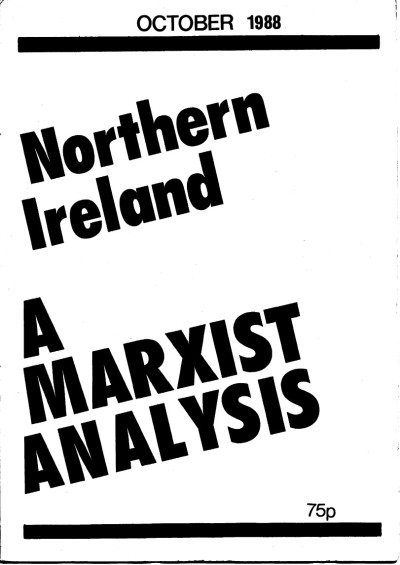
| Date: | October 1988 |
|---|---|
| Organisation: | Militant |
| Author: | Peter Hadden |
| View: | View Document |
| Discuss: | Comments on this document |
| Subjects: |
Please note: The Irish Left Archive is provided as a non-commercial historical resource, open to all, and has reproduced this document as an accessible digital reference. Copyright remains with its original authors. If used on other sites, we would appreciate a link back and reference to The Irish Left Archive, in addition to the original creators. For re-publication, commercial, or other uses, please contact the original owners. If documents provided to The Irish Left Archive have been created for or added to other online archives, please inform us so sources can be credited.
Commentary From The Cedar Lounge Revolution
22nd September 2014
This is a Northern Perspectives document from Militant written in Belfast by Peter Hadden. Any clarification of its provenance would be very much appreciated. A relatively long form publication, produced as a series of bullet pointed paragraphs, it provides a useful snapshot into the thinking of that formation during that period.
In relation to the analysis it argues that:
Over the 20 years of the troubles in Northern Ireland, the analysis and perspectives of the marxists have been strikingly confirmed. While every other tendency within society has been caught entirely unaware by these events, the marxists have been able to explain the fundamental processes at work. In this laboratory of social ferment the superiority of marxism over all other modes of thought has been demonstrated. It has been the victory of scientific thinking over empiricism, of ‘foresight over astonishment!’
And it continues:
Twenty years ago a revolutionary opportunity existed in the north. The crimes of the reformists and the stalinists, together with the infantile ultra-leftism of some of those involved in these events, combined to allow this opportunity to slip by. By the early 1970s, the working class paid for these crimes and errors in the form of intense sectarianism reaction. In 1975/76 the working class intervened to halt the drift to all-out sectarian conflict. For a period of years class issues came to the fore. Again these opportunities were squandered by the rotten role of the trade union leaders in particular. The aftermath of the hunger strikes of the early 1980s, coupled with the industrial and political defeats suffered by the working class in Britain, prepared the way for a new period of relatively mild reaction. In this context the 1985 signing of the Anglo-Irish Agreement provoked a fierce sectarian backlash, depend the reaction and further set back the Labour movement. The result of these decades of reaction nd missed opportunity has been the entrenchment and reinforcement of the sectarian division. The tasks of building a revolutionary party and accomplishing the socialist revolution have been complicated and made much more difficult.
It states:
After twenty years of failed bourgeois initiatives and ‘solutions’ and particularly after nine years of the crude methods and crass errors of the Thatcher government, the prospect of even a temporary accommodation within the north has receded out of view. The social and economic crisis of capitalism in the north has now produced a complete paralysis in the political thinking of the bourgeois.
A new political initiative such as devolution, an assembly or convention is unlikely for a further period…while now less likely than ever it is not entirely excluded that an accommodation might be reached between the Unionist and SDLP leaders and elections held to some new local parliament… Such a result would be very difficult to achieve and liable to fall to pieces at any moment during its conception and establishment. NO matter what the subjective wishes of the SDLP and Unionist politicians, the basis for power sharing has been even further eroded by the sectarian reaction of recent years, and by the emergence of SF as a political force. Even if established a new local parliament would solve nothing.
And further:
Unable to advance towards even a temporary political settlement, the ruling a class are thrown back to military means. Repression is the distilled essence of their policy. Everything else having failed the Tories have greatly stepped up the use of repression. A continuation and intensification of this policy is the most likely scenario for a further period.
Though:
At some stage the ruling class will be forced to recognise the dangers of continuing with a purely military holding operation and be forced to attempt some new political initiative. In the sudden lurches of the bourgeois from political military methods and back again, from concession to repression, is expressed their total impotence in the face of this national conflict of their own past making.
Further on it argues that:
That SF can remain as an electoral force be accuse of the lack of any alternative to give expression to the anger of the Catholic workers particularly on the issue of repression. Because of their sectarian appeal and outlook they can achieve nothing. At best they can become the majority party of the minority, although this is not the most likely perspective.
And it argues that:
A section of the Provos have grown impatient at the lack of success of their strategy of a war of attrition stretching over ten, twenty or more yeas. This, together with the fact that the organisation is now equipped with large quantity of highly sophisticated weaponry – makes an attempt to dramatically escalate the military campaign,m the most likely immediate prospect.
There is much more, including the belief that a mass labour party may emerge ‘late in the revolutionary period’, but it concludes:
The objective situation is still difficult and may even deteriorate in the short term. However it is a contradictory situation. Despite the sectarian violence, the class issues are never far from the surface… this work is a preparation for the major struggles of the future. At some stage the movement will return to the traditionalise of 1907, 1919 or 1932. The ability of the marxists to intervene in and play a leading role in these events depends on the work of developing cadres being successfully carried out in periods such as now.
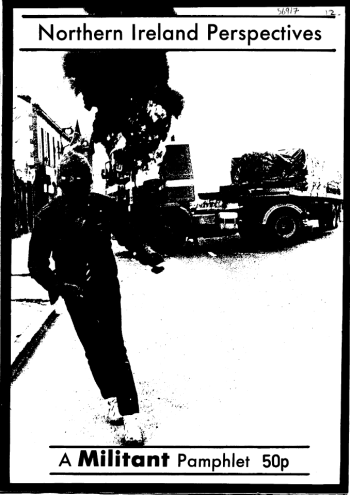
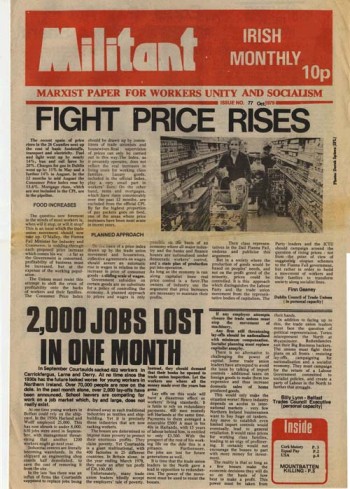
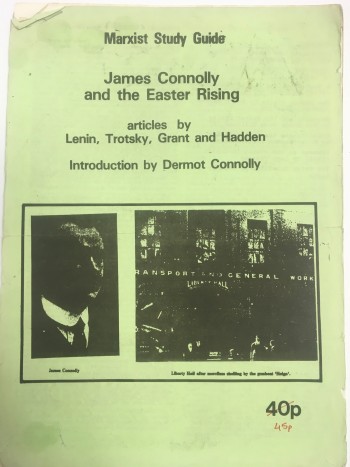
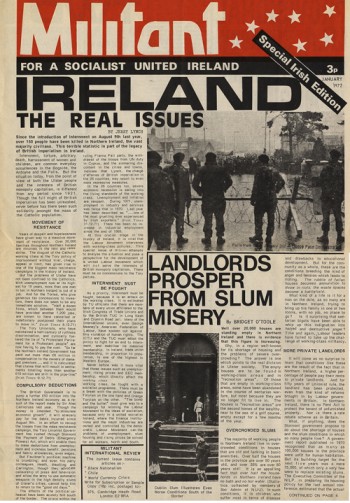
Comments
No Comments yet.
Add a Comment
Comments can be formatted in Markdown format . Use the toolbar to apply the correct syntax to your comment. The basic formats are:
**Bold text**
Bold text
_Italic text_
Italic text
[A link](http://www.example.com)
A link
You can join this discussion on The Cedar Lounge Revolution
By: Charle Mon, 22 Sep 2014 09:29:31
As a Northern Perspectives document, it would have come out of the Belfast office, not Dublin.
Reply on the CLR
By: Joe Mon, 22 Sep 2014 11:55:50
Marzists, reformists, stalinists, infantile ultra-leftism. You wouldn’t get that kind of terminology in an SP official document these days, would you? Of its time, I suppose.
Reply on the CLR
By: Jim Monaghan Mon, 22 Sep 2014 12:30:18
” At some stage the movement will return to the traditionalise of 1907, 1919 or 1932.” So the national struggle was always a diversion and Connolly was wrong. Surely a hypocrisy to claim Connolly then.
Reply on the CLR
By: workers republicu Mon, 22 Sep 2014 15:07:24
In reply to Jim Monaghan.
+1 good point Jim. Like Burton the SP like to claim to follow Connolly. Did they ever study his writings and consider his views on partition.Connolly knew Belfast , he united the workers there across the sectarian line
Reply on the CLR
By: Jolly Red Giant Mon, 22 Sep 2014 17:12:35
The document is a Northern Perspectives document that would have been presented to the Militant’s annual conference. The document was an internal document and was written by Peter Hadden.
It is written in a numbered paragraph format to facilitate discussion on the document and ease of reference to specific paragraphs.
As for the references to the writings of Connolly – well he repeatedly outlined that partition would lead to a carnival of reaction and the necessity for socialist revolution to emancipate the Irish working class.
Nationalism has nothing to offer the working class and the national question in Ireland cannot and will not be ultimately resolved except as part of a socialist revolution.
Lastly, Connolly was not infallible – and while working class unity in the North is vital to cut across sectarianism and the development of the workers movement, Connolly made mistakes during his time in Belfast in his approach to Protestant workers.
Reply on the CLR
By: WorldbyStorm Mon, 22 Sep 2014 18:15:58
In reply to Jolly Red Giant.
I was wondering whether it was for internal consumption or not. The price on the cover kind of threw me as well as the fact it’s not listed in Hadden’s works.Thanks for that.
Reply on the CLR
By: Roasted Snow Mon, 22 Sep 2014 22:27:56
I’ve got a similar doc from 1984, in fact very similar. The price was in my time for Militant branch members….
Reply on the CLR